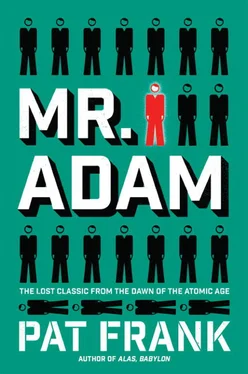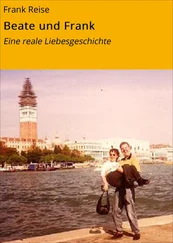“What a waste!” I said.
“What a waste indeed, at this period in history,” said Marge.
“Well, we’re working on the isolation problems, but meanwhile we want to start A.I. as quickly as possible,” Maria continued. “Suppose something happened to Homer Adam before we began? Anyway, we can not make maximum—perhaps not even normal—use of Homer Adam until he again becomes a tranquil, normal man. Even if we were able to use him in his present state—which is doubtful—we might create a race of physical and nervous wrecks.”
I didn’t sense what was coming. “What,” I inquired, “has this got to do with me?”
“I talked to Adam,” said Thompson. “He likes you, he trusts you, and he wonders what became of you. You made a very deep impression on him. What did you do?”
“Nothing,” I replied, “except let him beat me at gin rummy occasionally.”
Thompson grinned. “There is nothing so good for a man’s ego as to believe himself a shark at gin,” he said.
“In any case,” Maria concluded, “if the government decides that N.R.P. be placed in charge of Homer Adam, rather than the N.R.C., we want you to handle him.”
“Oh my God!” I said. “Nominated to be nursemaid to the potential father of his country!”
The controversy between the National Re-fertilization Project and the National Research Council was essentially between the physicians and the physicists—between the scientific workers in the animate and the inanimate fields. The atom-poppers believed they needed Mr. Adam for research which they hoped would undo the damage caused by the obscure rays which enwrapped the world after the Mississippi explosion. They needed Mr. Adam, they explained, much as they needed cyclotrons and centrifuges.
How could an antidote to the ray be developed until they knew exactly which ray had done the trick? And how could they isolate the ray which strangely wrecked male cells, and left females undisturbed, unless they had specimens for experimentation? And who was there, except Mr. Adam, to furnish these specimens?
The N.R.P. physicians pointed out, even as Maria had, that A.I. was the only sure way of keeping the globe populated. They hoped that the physicists of N.R.C. would find a method of restoring the potency of all men, but scientific research takes times. Meanwhile, they had on hand one single, priceless human who was insurance against entire extinction.
What finally decided the Joint Congressional Investigating Committee, and the Inter-Department Executive Committee, I am sure, was the unspoken fear that the scientists would make another mistake, mess up Mr. Adam, and then everybody would be finished. It was something that nobody spoke of, directly, for fear of injuring the sensibilities of men like Professor Pell, and damaging their professional reputation, but the fear was always there.
So I was not surprised, a few days later, when I picked up a copy of the New York Post while walking to the subway after my noon breakfast in Smith Field, to read the black headlines that covered the whole front page:
PRESIDENT OKAYS A.I.!
N.R.P. WINS OVER N.R.C. BUT SCIENTISTS TO GET FUND TO CONTINUE RESEARCH
WOULD-BE MOTHERS VOLUNTEER THROUGHOUT NATION
ENGLAND ASKS AID
When I reached the office, J.C. set me to putting together the foreign reactions in a single story. As usual there was no official comment from Moscow, but Pravda printed an oblique little box on its front page pointing out that is was possible for the United States to make amends for the world catastrophe caused by Mississippi, but that thus far the United States had not approached the Soviet Union directly.
The word “directly” was the important word. It was seized upon, that very day, in the Senate. Had anybody in the Administration, certain Senators wished to know, been dealing secretly on sharing Homer Adam with the Communists? If so, what arrangements had been discussed? It was hoped that Homer Adam would not be shipped outside the territorial limits of the United States.
Senator Salt plausibly replied that A.I. being what is was, it was not necessary to ship Homer Adam anywhere, just the male germ.
Any peace-loving nation, Salt said, could be helped out without Homer ever leaving Washington. Russia had as much right to hope for perpetuating herself as any other nation—more than some he could mention.
FROGHAM (D. Louisiana): Will the Senator yield?
SALT: I yield.
FROGHAM: Is it not a fact that we could forever dispose of this damnable Communism, which is infecting the whole world and causing strikes and disturbances and menacing the very foundations of the Republic, say within two generations, by simply confining A.I. to those nations which are willing to give us definite statements as to their future foreign policies, and their territorial and ideological intentions?
VIDMER (R. Massachusetts): If we only give A.I. to those nations which know their future foreign policy, then we will have to exclude the United States. (Laughter.)
The story from London was matter-of-fact. England expected that the United States would share A.I., on a population basis, and in return England would give the United States the full benefit of any happy information reaching its own scientists. The British government felt it was speaking for the whole Empire. It didn’t say anything about Ireland.
In Paris, all the newspapers published editorials pointing out France’s great past cultural contributions to the world, and insisting that it was a necessity that French culture continue.
Various good Germans talked of the benefits of a revival of German industrial genius in succeeding generations.
The Japanese press talked of traditional American sportsmanship, and pointed out that baseball was played in both countries.
All the little nations extolled their own virtues. But the Bucharest press pointed out, coyly, that if A.I. was denied to Hungary, then that would be a final solution to the question of Transylvania—which everybody thought had already been solved.
The cables kept rolling in, but before night J.C. Pogey came over to my desk, and motioned me into his office.
“Steve,” he said, “I just got a call from the White House. Danny Williams—the President’s Secretary. Used to work for us. Well, they want you down there to handle Adam.”
“That’s what I was afraid of,” I said.
“It seems they think you did a good job in Tarrytown. Adam likes you.”
“Yeah?”
“The N.R.P. asked for you. They’re going to put you on their payroll. We’ll give you leave of absence.”
“Haven’t I got anything to say about this?” I demanded.
“Not much,” said J.C. “Danny Williams put it this way—he said it was in the interests of civilization. I don’t like to lose you, but it is exactly the same as if you were drafted.”
“You don’t care much, do you, J.C., whether civilization keeps on or not?”
J.C. rubbed his thumbs behind his ears. “Dunno,” he said. “Haven’t made up my mind yet.”
I went home and packed. “They certainly called for you in a hurry,” Marge said.
“Yes,” I agreed, not wanting to leave her, and not wanting to leave Smith Field, and wondering how long it would be before Homer Adam could be cooled off and calmed to a point where he would become useful to civilization, and N.R.P. would let me go.
“You behave down there,” Marge commanded. “That town is full of good-looking women, and they don’t seem to have any inhibitions any more.”
“I’ll behave,” I promised.
“You’d better. I’m liable to pop in on you any time—any time at all. And Stephen,” she added, “do a good job, will you. It’s awfully important to me.”
Читать дальше












